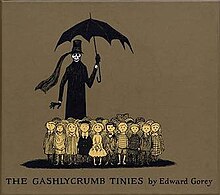The Gashlycrumb Tinies: or, After the Outing is an alphabet book written by Edward Gorey that was first published in 1963 as the first of a collection of short stories called The Vinegar Works, the eleventh work by Gorey. The book tells the tale of 26 children (each representing a letter of the alphabet) and their untimely deaths. It is one of Edward Gorey's best-known books[1] and is the most notorious amongst his roughly half-dozen mock alphabets.[2] It has been described as a "sarcastic rebellion against a view of childhood that is sunny, idyllic, and instructive".[2] The morbid humor of the book comes in part from the mundane ways in which the children in the story die, such as falling down the stairs or choking on a peach. Far from illustrating the dramatic and fantastical childhood nightmares, these scenarios instead poke fun at the banal paranoias that come as a part of parenting.[3]
 | |
| Author | Edward Gorey |
|---|---|
| Genre | Alphabet book |
| Published | 1963 |
Gorey has stated the book to be inspired by "those 19th-century cautionary tales, I guess, though my book is punishment without misbehavior".[4]
Description
editThe book tells of the deaths of twenty-six children in thirteen rhyming dactylic couplets, accompanied by the author's distinctive black-and-white illustrations. The book incorporates several elements common to alphabet books, such as naming each child in the book after a letter in the English alphabet and including illustrations for each entry. It describes the cause of death for each child, such as being set on fire, being run over by a train or being attacked by wild animals.
See also
editReferences
edit- ^ Tina Kelley (2000-04-16). "Edward Gorey, Eerie Illustrator And Writer, 75". New York Times. Retrieved 2013-11-05.
- ^ a b Bodmer, George R. (Fall 1989). "The Post-Modern Alphabet: Extending the Limits of the Contemporary Alphabet Book, from Seuss to Gorey". Children's Literature Association Quarterly. 14 (3). Johns Hopkins University Press: 115–117. doi:10.1353/chq.0.0838. S2CID 143221079. Retrieved May 21, 2022.
- ^ Kevin Shortsleeve (Spring 2002). "Edward Gorey, Children's Literature, and Nonsense Verse". Children's Literature Association Quarterly. 27 (1). Johns Hopkins University Press: 27–39. doi:10.1353/chq.0.1442. S2CID 144756269. Retrieved May 21, 2022.
- ^ Haskel Frankel, "Edward Gorey: Professionally Preoccupied with Death", Herald Tribune, August 25, 1963